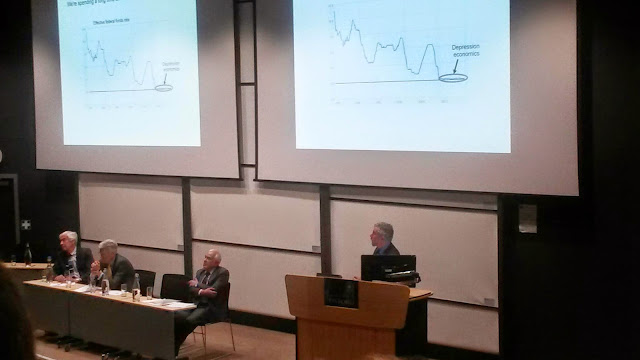I just had dinner with a friend who's a senior KL banker. She's a bit worried in the shorter term that the VIX volatility index is low, indicating market complacency. We talked about how it seems necessary to boost aggregate demand for employment creation and such; but the low rates policy of the last few years has just fed into non-productive sectors such as financial trading and investment, property and the like with nary a curb on the property sector in many countries. Thus, in Malaysia it seemed a good thing that BNM has been trying to curb the property sector - albeit with some major developers trying to be exempted e.g. in Iskandar Malaysia (here, there is talk of higher price hurdle for foreign buyers but I wonder if big property project owners will allow that).
I'm just a bit concerned about the unintended consequences of what is seemingly the extension of a well-intended policy. Policy making seems controlled by political-rich business interests. They have seemed hardly inclined to put in holistic policies to funnel all the QE money into the right direction. Are they doing things any differently this time with negative rates? The market neo-liberal hegemony is pretty strong.
I've been reading the latest Michael Lewis book, "Flash Boys" that talks about how smart people in the financial sector play and direct regulations to their benefit. I've been analyzing sustainability certification in commodity supply-chains - this is also another regulation that gets linked up with commercial interests. Regulations of increasing complexity benefit those who are able to figure them out and work them to their benefit i.e. mostly the richer companies. Do we end up with a better world as a result of this? In food regulation, I just read a Time.com piece that said that business interests have managed to get pizza defined as a vegetable in the US! Read this: How Sugar Went From a Condiment to a Diet Staple http://time.com/2812756/how-sugar-went-from-a-condiment-to-a-diet-staple/.
The common feature in all of this: well-intended policies seem to just keep getting hijacked by interest groups and big business. The outcomes end up rather unexpected if not even paradoxical.
I wonder whether this extension of a less than successful economic policy will get us nice job creation for the man in the street or whether it's just another round of asset price pumping for the rich. If the policy has not been well implemented, does escalating it work? Is the policy itself wrong? Is there a structural problem in policy making and more?
Hope it works out successfully in short time so we can get back to regular policy. Time for you all to go out and spend and invest in property, art, wine or whatever... just take your money out from the bank and get it moving ! Just so long as you're not an ageing pensioner...
................
ECB Announces Measures to Boost Bank Lending
The European Central Bank said it will introduce a series of measures designed to boost bank lending and head off dangerously low inflation, after announcing a series of interest-rate cuts.
Among the initiatives announced by ECB President Mario Draghi were targeted long-term refinancing operations, which will give banks access to low-interest-rate loans.
The euro plunged to a four-month low against the dollar after the ECB announced the package, falling 0.7% to $1.3503 from above $1.36 before the central bank's rate cuts, while European stocks rose to a fresh six-and-a-half-year high.




